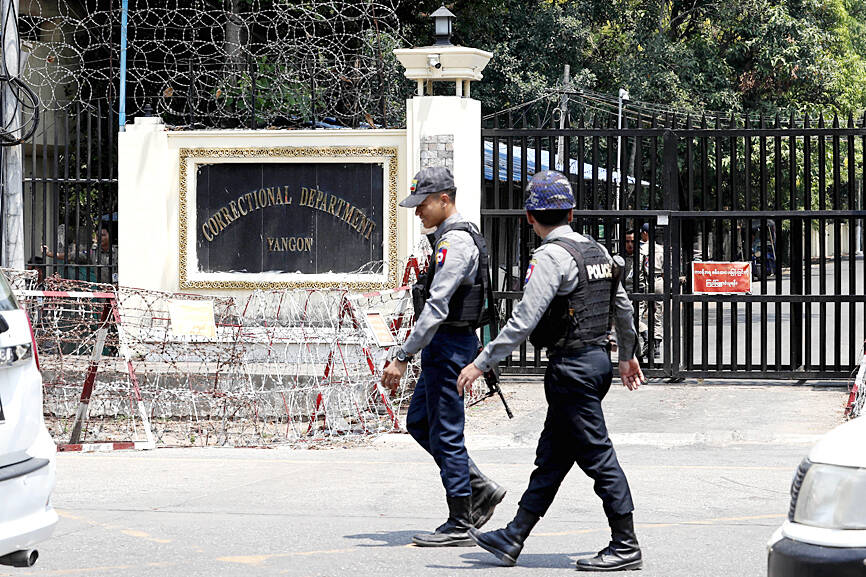Myanmar’s jailed former leader Aung San Suu Kyi has been moved from prison to house arrest as a health measure due to a heat wave, the military government said as it freed more than 3,000 prisoners under an amnesty to mark this week’s traditional New Year holiday.
Aung San Suu Kyi, 78, and Win Myint, the 72-year-old former president of her ousted government, were among the elderly and infirm prisoners moved to house arrest because of the severe heat, military spokesperson Major General General Zaw Min Tun told foreign media representatives late on Tuesday.
The move had not been publicly announced in Myanmar.

Photo: EPA-EFE
Aung San Suu Kyi’s transfer comes as the army has been suffering a string of major defeats at the hands of resistance fighters and their allies in ethnic minority guerrilla forces.
The nationwide conflict began after the army ousted the elected government in February 2021, imprisoned Aung San Suu Kyi and began suppressing nonviolent protests that sought a return to democratic rule.
Aung San Suu Kyi had been serving a 27-year prison term in a specially built annex of the main prison in the capital, Naypyidaw, where Myanmar’s meteorological department said temperatures reached 39°C on Tuesday afternoon.
Win Myint was serving an eight-year prison sentence in Taungoo in Myanmar’s Bago region.
Aung San Suu Kyi’s health has reportedly deteriorated in prison.
In September last year, reports emerged that she had symptoms of low blood pressure, including dizziness and loss of appetite, but had been denied treatment at qualified facilities outside the prison system.
Those reports could not be independently confirmed, but her younger son Kim Aris said in interviews that he had heard that his mother had been extremely ill, and had gum problems and was unable to eat.
Kim Aris, who lives in the UK, called for Myanmar’s military government to be pressured to free his mother and other political prisoners.

Tropical Storm Gaemi strengthened into a typhoon at 2pm yesterday, and could make landfall in Yilan County tomorrow, the Central Weather Administration (CWA) said yesterday. The agency was scheduled to issue a sea warning at 11:30pm yesterday, and could issue a land warning later today. Gaemi was moving north-northwest at 4kph, carrying maximum sustained winds near its center of up to 118.8kph and gusts of 154.8kph. The circumference is forecast to reach eastern Taiwan tomorrow morning, with the center making landfall in Yilan County later that night before departing from the north coast, CWA weather forecaster Kuan Shin-ping (官欣平) said yesterday. Uncertainty remains and

SEA WARNING LIKELY: The storm, named Gaemi, could become a moderate typhoon on Wednesday or Thursday, with the Taipei City Government preparing for flooding A tropical depression east of the Philippines developed into a tropical storm named Gaemi at 2pm yesterday, and was moving toward eastern Taiwan, the Central Weather Administration (CWA) said. Gaemi could begin to affect Taiwan proper on Tuesday, lasting until Friday, and could develop into a moderate typhoon on Wednesday or Thursday, it said. A sea warning for Gaemi could be issued as early as Tuesday morning, it added. Gaemi, the third tropical storm in the Pacific Ocean this typhoon season, is projected to begin moving northwest today, and be closest to Taiwan on Wednesday or Thursday, the agency said. Today, there would likely

DISRUPTIONS: The high-speed rail is to operate as normal, while several airlines either canceled flights or announced early departures or late arrivals Schools and offices in 15 cities and counties are to be closed today due to Typhoon Gaemi, local governments announced last night. The 15 are: Taipei, New Taipei City, Taoyuan, Tainan, Keelung, Hsinchu and Kaohsiung, as well as Yilan, Hualien, Hsinchu, Miaoli, Chiayi, Pingtung, Penghu and Lienchiang counties. People should brace for torrential rainfall brought by the storm, with its center forecast to make landfall on the east coast between tonight and tomorrow morning, the Central Weather Administration (CWA) said. The agency issued a sea warning for the typhoon at 11:30pm on Monday, followed by a land warning at 11:30am yesterday. As of

CASUALTY: A 70-year-old woman was killed by a falling tree in Kaohsiung as the premier warned all government agencies to remain on high alert for the next 24 hours Schools and offices nationwide are to be closed for a second day today as Typhoon Gaemi crosses over the nation, bringing torrential rain and whipping winds. Gaemi was forecast to make landfall late last night. From Tuesday night, its outer band brought substantial rainfall and strong winds to the nation. As of 6:15pm last night, the typhoon’s center was 20km southeast of Hualien County, Central Weather Administration (CWA) data showed. It was moving at 19kph and had a radius of 250km. As of 3pm yesterday, one woman had died, while 58 people were injured, the Central Emergency Operation Center said. The 70-year-old